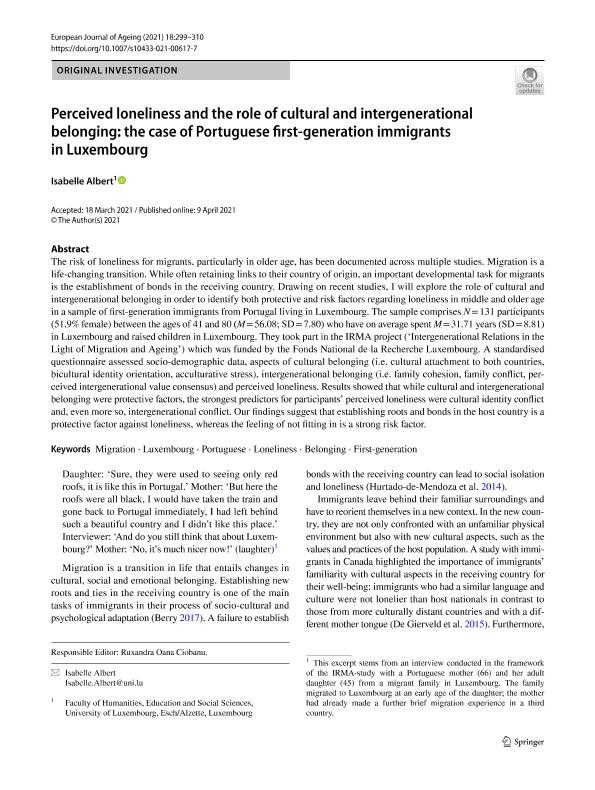| LDR | | | 00000cab a2200000 4500 |
| 001 | | | MAP20210019920 |
| 003 | | | MAP |
| 005 | | | 20210921161103.0 |
| 008 | | | 210921e20210913esp|||p |0|||b|spa d |
| 040 | | | $aMAP$bspa$dMAP |
| 084 | | | $a931.2 |
| 100 | 1 | | $0MAPA20080651886$aAlbert, Isabelle |
| 245 | 1 | 0 | $aPerceived loneliness and the role of cultural and intergenerational belonging$b: the case of Portuguese first-generation immigrants in Luxembourg$cIsabelle Albert |
| 520 | | | $aThe risk of loneliness for migrants, particularly in older age, has been documented across multiple studies. Migration is a life-changing transition. While often retaining links to their country of origin, an important developmental task for migrants is the establishment of bonds in the receiving country. Drawing on recent studies, I will explore the role of cultural and intergenerational belonging in order to identify both protective and risk factors regarding loneliness in middle and older age in a sample of first-generation immigrants from Portugal living in Luxembourg. The sample comprises N?=?131 participants (51.9% female) between the ages of 41 and 80 (M?=?56.08; SD?=?7.80) who have on average spent M?=?31.71 years (SD?=?8.81) in Luxembourg and raised children in Luxembourg. They took part in the IRMA project (Intergenerational Relations in the Light of Migration and Ageing') which was funded by the Fonds National de la Recherche Luxembourg. A standardised questionnaire assessed socio-demographic data, aspects of cultural belonging (i.e. cultural attachment to both countries, bicultural identity orientation, acculturative stress), intergenerational belonging (i.e. family cohesion, family conflict, perceived intergenerational value consensus) and perceived loneliness. Results showed that while cultural and intergenerational belonging were protective factors, the strongest predictors for participants' perceived loneliness were cultural identity conflict and, even more so, intergenerational conflict. Our findings suggest that establishing roots and bonds in the host country is a protective factor against loneliness, whereas the feeling of not fitting in is a strong risk factor. |
| 540 | | | $aLa copia digital se distribuye bajo licencia "Attribution 4.0 International (CC BY 4.0)"$f$uhttps://creativecommons.org/licenses/by/4.0$943 |
| 650 | | 4 | $0MAPA20080555016$aLongevidad |
| 650 | | 4 | $0MAPA20100044407$aPersonas mayores |
| 651 | | 1 | $0MAPA20080638238$aLuxemburgo |
| 773 | 0 | | $wMAP20210024146$tEuropean Journal of Ageing : social, behavioural and health perspectives$dCham, Switzerland [etc.] : Springer International Publishing AG, 2021-$g13/09/2021 Volumen 18 Número 3 - 2021 , p. 299-310 |
| 856 | | | $qapplication/pdf$w346$yRecurso electrónico / Electronic resource |


